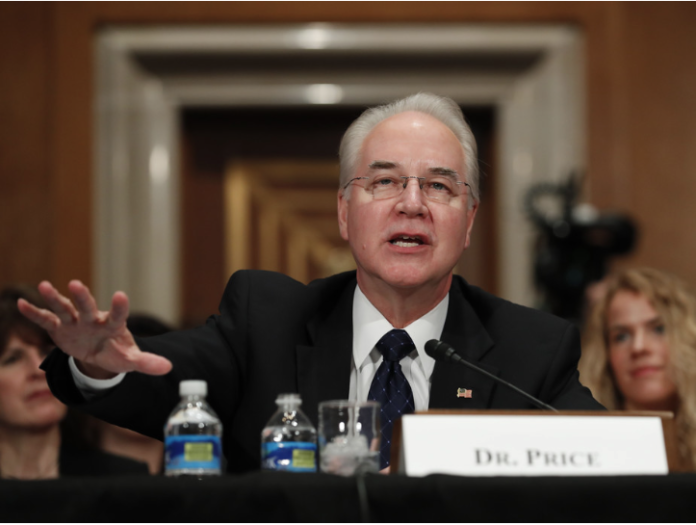
Miranda Yaver, Yale University
It is hardly unusual for Cabinet nominees to leave more questions than answers after their confirmation hearings. Yet for the millions whose lives hang in the balance depending on the future of the Affordable Care Act, Rep. Tom Price’s (R-Ga.) answers were surprisingly vague on Jan. 18 – especially coming from a man who has authored a detailed, 242-page replacement for the ACA, more commonly called Obamacare.
Price appeared before the Senate Committee on Health, Education, Labor, and Pensions (HELP) for confirmation as secretary of health and human services, which oversees and administers Obamacare.
His hearing came only a day after the nonpartisan Congressional Budget Office released a report on the economic impact of a repeal of the ACA. Price has consistently voted for repeal.
The CBO projected that in the first year of health plans following an ACA repeal, 18 million would become uninsured, with that number growing to 32 million becoming uninsured in 2026. It also forecast those who do not become uninsured will face higher premiums.
With Republicans so far failing to coalesce around a single replacement plan, the report provided added support for those claiming that a repeal would be unwise if not reckless. Price also voted with the House Republicans to move forward with the repeal, without a viable alternative to preserve the health care gains that were made under the act.
Thus, Price’s answers mattered to millions. As a health policy scholar, I think it is important to analyze what he said and what he didn’t say. I’ll also offer some questions for his second hearing, which is scheduled for Jan. 24 before the Senate Finance Committee
While he is most likely a shoo-in, it is vital nonetheless to understand his answers so we can gain insight into the direction the vast Department of Health and Human Services (HHS) is heading.
‘Greater choices and options’
When pushed on policy specifics, Price often punted by saying Congress would provide the policy details that he, as secretary of HHS, would administer. This is despite the significant policy impact he would have with respect to the nation’s health care delivery.
He did not commit to protecting those with preexisting conditions. He did not list the essential health benefits to be covered. Instead, he said, “I think it’s absolutely imperative that we have a system in place that works for patients.” He reiterated an interest in moving toward “greater choices and options for them to gain the kind of coverage they want for themselves and their families.”
While such goals are optimal, to be sure, Price rarely offered anything more concrete. He also did not explain how that lined up with his 242-page plan, which called for repeal of the ACA and a new plan based on tax credits and savings plans.
No one challenged him on the fact that millions of consumers believe the ACA is a “system in place that works for patients.” And, of course, he wasn’t going to acknowledge that.
Is health care a right? He didn’t say

Carolyn Kaster/AP
While many issues divide the parties, health care is perhaps unique in the extent to which it is so deeply human and, in all too many cases, life or death. As such, Sen. Bernie Sanders (I-VT) raised the question that dominated the Democratic Party primary: Is health care a right?
Price avoided the yes-or-no question, instead saying that he looked forward to working with Congress to ensure “access” to care. He also answered by saying that the United States is a “compassionate society,” at which point Sanders interrupted and said “no, we are not…”
Planned Parenthood questions
Sen. Patty Murray (D-WA) was the main one to press Price on the matters of access to contraception and other women’s health services. Price has championed the defunding of Planned Parenthood, despite the fact that no federal funds can be used for abortion services anywhere. Many want to defund Planned Parenthood because it offers abortion services at some centers.
Indeed, the Guttmacher Institute reported recently that in 332 of the 491 counties in which Planned Parenthood clinics are located, Planned Parenthood served at least half of the women receiving contraception from safety-net health centers.
Despite empirical evidence to support that Planned Parenthood expands the availability of contraception, Price would not in the hearing commit to maintaining coverage of all FDA-approved contraceptive methods.
Questions for second hearing
Price acknowledged that these are important issues, which one might expect from a nominee of the federal department charged with overseeing them. Yet his answers were vague at best. He proclaimed a commitment to access to the care that people want, though he often conflated access and affordable care that people ultimately can receive. He articulated goals and interests, but he declined to define them and how he would achieve them.
Indeed, many Democrats on the HELP committee worked to point out that the Republican Party’s proposals are a far cry from Mr. Trump’s recent claim to support “insurance for everybody,” a proposal from which Trump staffers Kellyanne Conway and Sean Spicer both quickly backed away.
Some spotlight was notably occupied by reports of his trading in stocks of companies that were the subject of legislation that he introduced in Congress.
Price traded US$300,000 in health stocks since 2012, which Sen. Al Franken (D-MN) and others pointed to. Price dismissed this point on the grounds that he worked through a broker and was unaware of the fact.
Given the Republican majority in Congress, the prospects for confirmation of Mr. Trump’s nominees are quite good.
However, though Sen. Susan Collins (R-ME) voted with the Republican majority in its first step toward the repeal of the ACA, she expressed dismay over the the Republicans’ tying the act’s repeal to defunding of Planned Parenthood.
Given Price’s rather extreme views on this subject, her vote may be one for which to look out, though his ultimate confirmation is likely.
He is scheduled to appear before the Senate Finance Committee Jan. 24. Here are some questions I’d suggest that the senators ask:
-
What does Price view as his role as HHS secretary with respect to Planned Parenthood and other Republicans’ efforts to defund?
-
As Price cosponsored the National Right to Life Act, which defined 14th Amendment protections as applying at the moment of fertilization, does he want to end the availability of emergency contraception?
-
One area in which the American medical system is strained is its dearth of general practitioners. Are there any things that you might seek to do to address this limited access to primary care?
-
What would Price do to ensure more vigorous enforcement of parity for mental health conditions, including addiction?
There’s a lot on the line.
![]()
Miranda Yaver, Lecturer in Political Science, Yale University
This article was originally published on The Conversation. Read the original article.




















